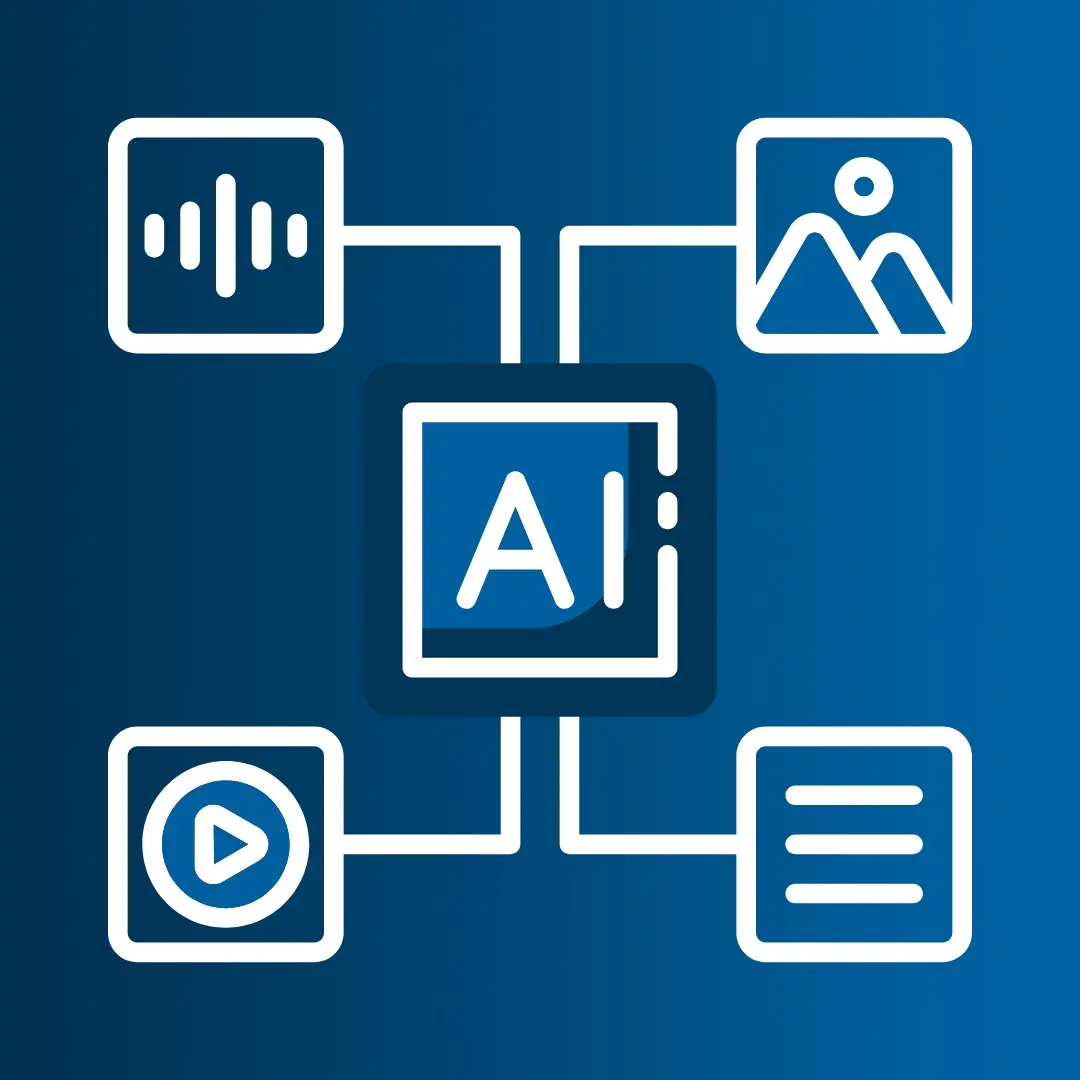AI in Marketing Research Center

"Artificial intelligence is changing marketing – strategically,
operationally, and culturally. It requires new skills, ethical
guidelines, and a deeper understanding of customer behavior.
Our Research Center investigates how AI can be used effectively and responsibly along the customer journey."
Gioia Volkmar, PhD, Head of AI in Marketing Research Center
The AI in Marketing Research Center is the research-oriented platform of the Institute of Marketing Management at the ZHAW School of Management and Law. We bring together projects from various departments that deal with AI in marketing. Our goal is to contribute to the transformation of business and society with scientifically sound findings—in a practical, interdisciplinary, and forward-looking manner.
Our researchers

Umut Demiriz
"My research focuses on data-driven topics such as quality assurance and processing large data sets (cleaning, transformation, visualisation). I write scientific publications and grant applications and lead data-driven teaching units and projects, especially by developing practical, research-based teaching concepts and materials."
Research areas:
- Data management and quality assurance
- Data visualisation and transformation
- Didactic concepts for data-driven teaching.
- Scientific publications and research proposals.

Manuel Holler, PhD
“My research focuses on the valuable applications of emerging technologies, such as artificial intelligence, the industrial metaverse and smart products. My aim is to translate these insights into sustainable products and services.”
Research focus:
- Potential analyses of emerging technologies such as AI
- AI-based innovation process
- AI-based smart products and services
Selected publications and (media) contributions:
- Holler, M., van Giffen, B., Seifert, F., Mahendra Mistry, N., & Reinshagen, M. (2023). AI Maturity and Business Model Toolkit. F&E-Konferenz.
- Holler, M., Eloranta, T., & Demiriz, U. (2024). Potential of the Industrial Metaverse – A Taxonomic Approach. International Conference on PLM.
- Holler, M., Korbel, J. J., & Galeno, G. (2024). Industrial Metaverse for Industrial Companies: An Exploratory Study. Smart Services Summit.

Gioia Volkmar, PhD
“My research focuses on psychological decision-making processes, user acceptance of AI systems, and how companies can use artificial intelligence in marketing in a responsible and effective way. I am particularly interested in the connection between psychology, technological innovation, and the regulatory and ethical frameworks surrounding AI.”
Research areas:
- AI in marketing
- Psychology & decision-making behavior
- User acceptance of AI systems
- Explainability & trust in AI
- Regulatory and ethical aspects of AI
Selected publications and (media) contributions:
- Volkmar, G., Fischer, P. M., & Reinecke, S. (2022). Artificial Intelligence and Machine Learning: Exploring Drivers, Barriers, and Future Developments in Marketing Management. Journal of Business Research, 149(10), 599–614.
- Volkmar, G., Stallone, V., Heierli, R. (2025). Balancing Potential and Ethics: a Comprehensive Exploration of AI in Marketing. Proceedings of the 2025 AMS World Conference, Dijon, France (forthcoming)
- Use of AI in Marketing – Regulatory Issues (Schulthess Forum on Legal Questions)
- Latest AI Technologies in Asia (Swiss Retail Federation)
Our key topics
Strategic integration of AI in marketing

Artificial intelligence is fundamentally changing marketing—technologically, strategically, organizationally, and culturally. We examine how companies integrate AI into marketing to gain competitive advantages. The focus is on analyzing structures, assessing AI maturity, and developing scalable, customer-centric roadmaps—scientifically sound and practical.
Specific questions:
- What organizational, cultural, and structural prerequisites promote successful AI transformation in marketing?
- What strategies enable sustainable, value-oriented integration of AI along the customer journey?
Generative AI in marketing

We explore how artificial intelligence can be used operationally and creatively in marketing, media, and communication. It automates recurring tasks, enables data-based personalization, and creates new possibilities with generative AI for texts, images, videos, and interactive formats. The opportunities, limitations, and implications of these technologies are at the heart of our analysis.
Specific questions:
- How is AI changing the development of content in marketing, PR, and media?
- What role does AI play in qualitative and/or quantitative market research?
- How does the use of AI influence the emotional experience of brands?
Legal orientation: Designing AI in marketing to be legally compliant

Artificial intelligence in marketing must not only be effective, but also legally compliant and transparent. Companies face the challenge of implementing new legal requirements—such as those imposed by the EU AI Act—while at the same time reconciling data protection, copyright, and brand management in the digital age.
Specific questions:
- What new obligations and risks does the EU AI Act create for marketing and communication?
- How can companies reconcile data protection, copyright, and brand management in the AI age?
Ethical responsibility and governance: guidelines for fair AI use

In addition to legal aspects, the ethical dimension is also crucial: the use of AI in marketing must not lead to discrimination, lack of transparency, or manipulation. To counteract this, clear ethical guidelines and internal structures are needed to promote responsible use. This is where governance comes in—with values, processes, and controls for fair AI use.
Specific questions:
- What ethical guidelines are needed for the use of generative AI?
- How can companies develop governance structures that systematically anchor responsible AI use?
Acceptance and user perspectives

Consumer acceptance of AI is crucial to its success. We examine psychological, sociocultural, and communicative factors that shape perception, trust, and willingness to use AI. Using user research methods, we analyze expectations and barriers to acceptance. This results in AI applications that are not only technically compatible but also socially acceptable.
Specific questions:
- What role do transparency, control, and explainability play in trust in AI systems?
- To what extent do users want explanations for AI decisions – and how should these be presented?
- How do people react emotionally to AI-based communication – e.g., through chatbots or avatars?
- What requirements arise for the design of empathetic, respectful, and socially compatible AI systems?
AI and social issues

The use of AI raises key social questions—for example, about fairness, transparency, algorithmic discrimination, and the impact on work, consumer behavior, and social structures.
We explore these interactions from an interdisciplinary perspective and develop approaches for the responsible, socially acceptable use of AI.
Specific questions:
- To what extent do AI systems change power relations in communication, work, consumption, or education?
- Which social norms and values should be embedded in the development of AI?
Our methods: empirically sound, applied in a practical manner
Our research combines scientific excellence with practical relevance. Depending on the issue, target group and application context, we work with a broad spectrum of methods that integrate qualitative and quantitative approaches.
These include:
- Behavioural science experiments
- Conjoint analyses for evaluating products, pricing models or communication content
- Segmentation and market analyses based on survey and behavioural data.
- Predictive analytics and machine learning.
- In-depth interviews, focus groups and ethnographic methods.
Our strength lies in conducting research in real-world contexts together with companies, organisations and consumers.
Current projects
- AI Barometer Study 2025
- Swiss AI Navigator
- Building Trust & Acceptance of Computer Vision Technology in Swiss Retail
- Unmasking Fake News with AI – See the Truth Behind the Headlines
- Empowering Swiss Education: AI Literacy for the Future
- Made by Human? Created by ChatGPT! Digital watermarks for GenAI
Education & Continuing Education
We incorporate our research into our teaching: In various modules at bachelor's, master's, and continuing education levels, we impart the latest findings on AI in marketing. Students benefit from research-oriented content and practical projects with companies.
Current continuing education courses:
- CAS AI Marketing Organisation (AIMO)
- CAS Marketing Automation & Artificial Intelligence (MAI)
- WBK KI im Marketing – Fundamentals
- WBK KI im Marketing – Ethics and Law
Integration of topics into bachelor-courses:
- Bachelor's: Communication and Media Psychology
- Bachelor's: International Business
Events & Lectures
- AI Barometer Launch Event 2025
On Thursday, 26 June 2025, the AI in Marketing Research Center presented the full results of the AI Barometer Study 2025, enriched by practical insights from renowned industry partners. - AMS World Marketing Congress 2025
Dr. Gioia Volkmar, Head of the AI in Marketing Research Center, participated in the AMS World Marketing Congress in Dijon from 2 to 4 July 2025. Her presence at this internationally renowned conference strengthened the global visibility of the institute and provided valuable input for our research-based teaching and company projects. - Publication of the AI Barometer Study 2025
Expected August 2025 (coming soon)